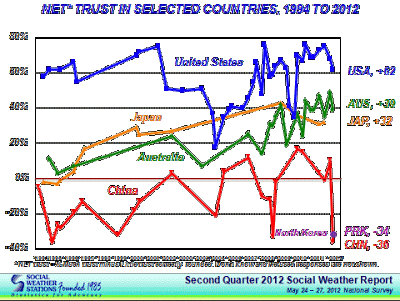♠ Posted by Emmanuel in Security,Southeast Asia
at 10/03/2012 09:19:00 AM
I was recently asked by my colleagues at LSE IDEAS to prepare a contribution on geopolitics in Southeast Asia, in particular the contest for regional influence between the United States and China. You would probably think that China has left the US for dead in winning over Southeast Asia since it has money to burn for winning over friends and influencing ASEAN members. But, the interesting thing is that China's territorial disputes with the likes of the Philippines and Vietnam over the South China Sea have left it in a far more precarious position than one would imagine after years of mounting charm offensives aimed at our region.When I made the assertion that the Philippine public regarded Americans much more favourably than they did the Chinese, our LSE IDEAS publications editor sent me in search of public opinion data confirming it. The above chart from the Social Weather Survey indicates depicts historical data on how Filipinos trust or distrust other countries going back to 1995. In light of the recent run-ins at the Scarborough Shoal which you are undoubtedly are aware of, Philippine public opinion of China is revisiting record lows previously plumbed during another South China Sea run-in:
The Second Quarter 2012 Social Weather Survey, fielded from May 24-27, 2012, found that 55% of adults have little trust, and 19% have much trust, in China, for a record-low bad net trust rating of -36 (% much trust minus % little trust). China's [previous] lowest net trust score of -36 was first reached in June 1995, during the Mischief Reef confronation between the Philippines and China. The survey also found that 48% of Filipinos paid close attention to news reports on the tension between the Philippines and China on the Scarborough Shoal issue.
Meanwhile, the former American colonizers get a comparative thumbs-up:
In contrast to China, most of the Filipino publics have much trust in the United States and Australia, and China's Northeast Asian neighbor, Japan. The United States, in particular, has been enjoying positive net trust ratings since December 1994, ranging from moderate +18 in May 2005 to excellent +76 in November 2010. As of May 2012, the United States scored a very good net trust rating of +62.
It must be galling to the Chinese authorities that after spending to receive such a negative appraisal after spending so much time attempting to build good ties with other countries in the region. After all, it is not an exaggeration to say that China set the template for others--including the United States--in terms of addressing security issues and forming a trade agreement with ASEAN. As you can see, it only takes a little discontent to undo a lot of previous work. What reasons are behind tolerating this PR/IR fiasco?
- The Chinese cannot back down since they teach their kids from an early age that their dominion over this area is longstanding and uncontested - even if most Chinese do not appreciate the finer points of international law, continental shelves, and exclusive economic zones, jingoism gets the better of state authorities;
- More so at a time of leadership handover, China cannot be seen as softening its stance or making concessions (see the previous link);
- Directing public anger against the likes of the Philippines in the South China Sea dispute or Japan in the East China Sea dispute is a good way of dealing with an economic slowdown in the PRC - not only does it shift attention away from things that matter more alive raising living standards, but it also encourages rallying behind the (red) flag in a manner that benefits the Communist regime.
That there is tacit Party approval of current expressions of public jingoism is in little doubt. However, the longer-term costs of having to rebuild relations must be weighed against the shorter-term benefits of distracting an increasingly restless Chinese public. While it is true that Philippine-PRC trade is hardly affected by all of this--nobody is calling for a mass boycott of Chinese products (which may not actually be possible in this day and age but that's another story)--the PRC's "peaceful rise" is indeed put into question.
Especially when the United States is the net beneficiary, China has to remember that while it has a number of ASEAN members in its corner alike Cambodia and Myanmar, its future influence over Southeast Asia will involve winning over the others as well who are also comparatively more developed and are longer-standing members of the association.
Really, you cannot do much worse than being trusted less than a country led by isolationist crazies with weird haircuts in North Korea.


